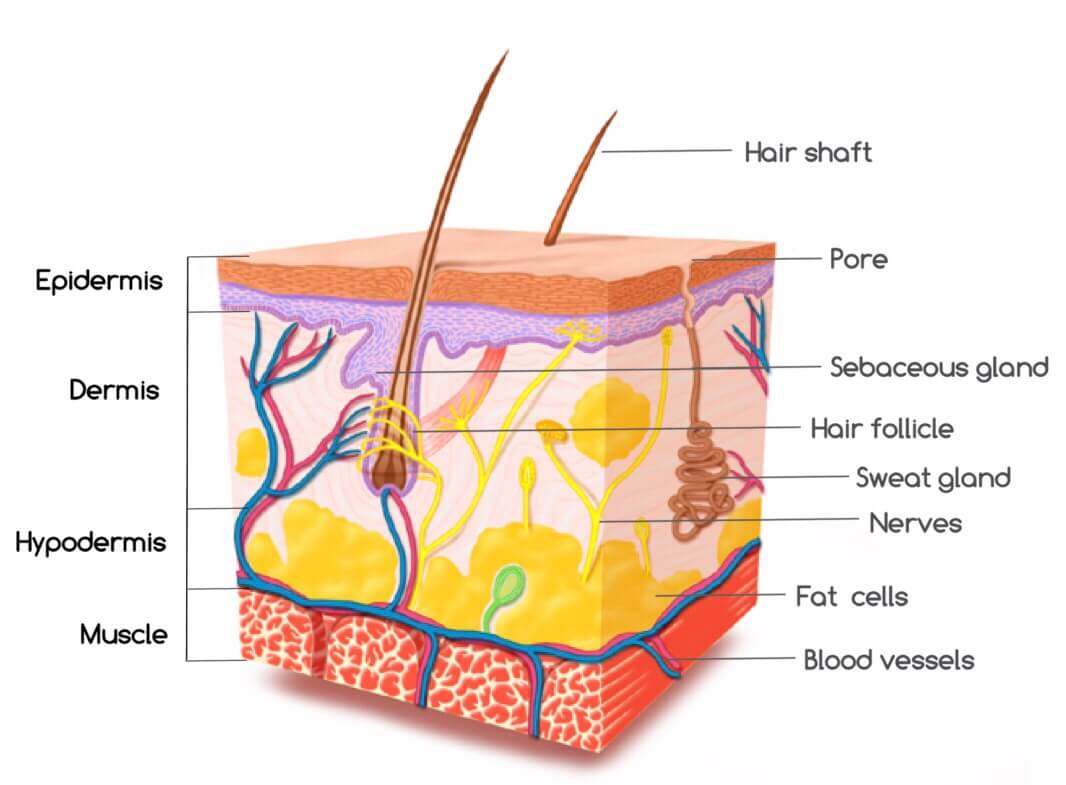FTC disclaimer: This post may contains affiliate links and we will be compensated if you click on a link and make a purchase.
Have you ever wondered how fish oil and skin health have anything to do with each other?
Once you know more about your skin and how to protect and repair it, it makes perfect sense that there is a link between fish oil and skin health.
Your Skin: It’s Much More Complicated Than You Think
Do you know your largest organ?
If you guessed skin, you are right.
If you didn’t guess skin, you don’t think of it as an organ. But, technically, the skin is the largest organ.
Understanding Skin Layers
Your skin has three layers. The outermost layer, the one you see, is called the epidermis. This layer is constantly replacing itself.

New skin cells are constantly developed and rise to the top of the epidermis, where they replace old, dead skin cells that fall off. Although you can’t see it happening, we lose about 30,000 to 40,000 dead skin cells every minute!
A substance called melanin which gives your skin its color, is also located in the epidermis.
The dermis contains nerve endings, blood vessels, oil glands, and sweat glands. The nerve endings enable you to feel things when you touch them.
The tiny blood vessels in the dermis keep your skin cells healthy by bringing them the oxygen and nutrients they need and taking away the waste.
The oil glands in the dermis are also called sebaceous glands, and they produce sebum, which is your skin’s natural oil.
It rises to the surface of your epidermis and keeps your skin lubricated and protected. It also makes your skin waterproof.
You also have sweat glands in your dermis. The sweat they produce escapes through pores in your skin.
The subcutaneous tissue is made mainly of fat. It helps your body stay warm, absorbs shocks, like if you bang into something, and holds your skin to all the tissues underneath it.
This skin layer is also where your hair begins. Each strand of hair grows out of a tube called a follicle.
It’s all about basic skin anatomy.
Let’s talk about how fish oil with Omega 3 can help keep this 3-layer organ healthy or repair it if it’s not healthy.
Omega 3 Fatty Acids Are An Essential Part Of Every Skin Cell
Fish oil contains Omega 3 fatty acids, principally Eicosapentaenoic acid (EPA) and Docosahexaenoic acid (DHA).
These are called essential fatty acids (EFA), and they are necessary for your health, yet your body does not produce them. It would help if you took EFAs through your diet.
EFAs are an essential part of the membrane of every cell in your body, including skin cells.
So that’s one-way fish oil aids skin health by giving your body the essential fatty acids to build healthy skin cells and repair damaged cells.
Unfortunately, many of us — especially those who eat a Western diet high in processed foods — take in woefully inadequate amounts of EFAs.
Benefits of Fish Oil for Skin Health
Fish oil is scientifically backed for its ability to improve overall health, and here are some reasons it can help your skin.
Better Circulation
According to research, fish oil has reduced cholesterol and improved overall circulation. Fish oil is vital for anyone who wants better-looking skin because your cells need constant nourishment.
Things that help to improve circulation like exercise and better sleep make your skin healthier, while bad habits that cut off circulation like smoking, lead to wrinkles and premature aging.
Improved Immunity
Research studies have shown that fish oil helps improve a person’s immunity, which comes in handy when dealing with bacteria on your face.
Bacteria is one key element that aggravates skin, especially when pores have been clogged. Being able to control it is essential, and it helps when you don’t have to use antibiotics.
Anti-Inflammatory Effects
Sometimes what people think is acne isn’t actually acne at all. It might be an allergic reaction to an environmental factor or eating a particular type of food.
The overall result looks the same when a person’s face gets inflamed and red.
Research revealed that fish oil is an element with anti-inflammatory properties, which comes in handy when you want to balance the look of your skin.
Stress Relief
Studies have shown that fish oil can help with depression and mood swings.
It helps balance out the chemistry in the brain while reducing stress and keeping your mind healthy.
Fish oil is incredibly beneficial for people suffering from skin problems because stress is a major contributing factor.
A depressed, sleepless, and worried person is more likely to have problematic skin.
Uses and Effectiveness of Fish Oil in Skin Conditions
Omega 3 is a natural anti-inflammatory. That’s significant because several skin problems are at least partially caused by inflammation. These include psoriasis, eczema, and acne.
Helps in the Improvement of Psoriasis
As long ago as 1980, scientists observed that Eskimos who eat diets rich in fatty fish and high in Omega 3s had a particularly low incidence of psoriasis. This led to many studies on the connection between fish oil and psoriasis.
One study, done in Germany, involved giving one group of volunteers a supplement that was primarily EPA Omega 3 fatty acid and another group a supplement that contained an Omega 6 fatty acid.
The result was that those taking the anti-inflammatory EPA had better skin while those taking the “bad fat” Omega 6s had more redness and scaling.
Another study from Denmark found similar results when they gave psoriasis patients EPA fish oil supplements.
58% of the patients in that study experienced moderate to excellent improvement, and another 23% experienced mild improvement.
Still, another study reported in the British Journal of Dermatology found fish oils were more effective at treating psoriasis than conventional treatment.
Study participants received 12 grams a day of EPA for at least six weeks. The results: 80% of these patients experienced skin improvements with less scaling and reduced redness.
Effective in Acne
As is also true of psoriasis, acne has been linked to a deficit in the EPA Omega 3 fatty acid.
Conversely, epidemiological studies show that communities that maintain a diet high in omega-3 fatty acids have lower rates of acne.
One study done as long ago as 1961 discovered that the lowest rates of acne were among adolescents consuming the most significant amounts of fish and seafood.
The primary signs of acne – oily skin, comedones, papules, pustules, and acne cysts – were significantly lower among the teenagers consuming a diet higher in oily fish.
Further studies have shown that Omega-3 supplementation can prevent skin inflammation and help to reduce the signs and symptoms of acne.
Improve Eczema Symptoms
Eczema is a form of dermatitis – an inflammation of the epidermis – characterized by skin dryness, swelling, redness, flaking, rashes, and excessive itchiness.
Omega-3 fatty acids may also help improve Eczema symptoms or alleviate them in patients with the most common type of Eczema, Atopic Eczema.
In the British Journal of Dermatology, one study gave 44 patients with Atopic Eczema daily tablets of either 5.7-gram Omega 3 supplements or placebos for eight weeks.
Those on the supplements recorded an average 18 percent reduction in their symptoms.
Commenting on the study, co-author Professor Margitta Worm said: “The results of this trial are fascinating as the data demonstrate that dietary DHA could be bioactive and may have a beneficial impact on the outcome of atopic eczema.”
Fish Oil Prevents And Repairs Sun Damage
Excessive exposure to the sun can cause skin damage and increase the risk of skin cancer.
However, scientific research has found that Omega-3 fish oil containing EPA can limit the damage to the skin produced by overexposure to the sun and can help to reduce the negative effect of ultraviolet (UV) rays.
A research study at the Baylor College of Medicine in Houston, Texas, found that people with a high intake of Omega-3 fish oil can stay out in the sun longer without damaging effects on their skin.
Study participants who supplemented Omega-3s took longer to sunburn than subjects who didn’t supplement or had a low dietary intake.
Further, the Omega 3 fish oil supplements significantly calmed the skin’s inflammatory responses to sun exposure, known to cause wrinkling and cell damage and to produce a cascade of effects that can lead to skin cancer.
The Best Fish Oil To Take For Skin Health
Not all fish oils are equally effective in aiding skin health.
Fish oil must be pure and not contaminated by pollutants to be effective.
The manufacturer should molecularly distill its fish oil and adhere to purity standards far above the other manufacturers.
When used for skin health, the fish oil you take must have maximum anti-inflammatory properties.
Good fish oil supplement has 2 ½ times the anti-inflammatory effect of regular fish oil. And again, they prove it through testing by independent laboratories.
On top of all that, such companies are consumer-focused and back all their products with a 100% money-back guarantee.








